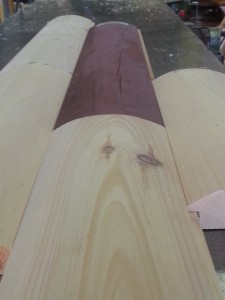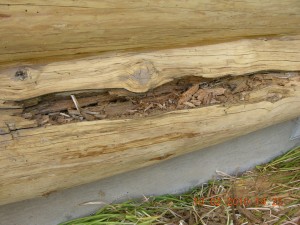Log Home Replacement Logs & Siding
It is typical for a log home, if not built or maintained correctly, to experience rot from high exposure to moisture. Rot commonly occurs on only the bottom rows of logs or siding. The best fix for logs or siding that are substantially rotted is to replace the affected area with new material.
We are specialists in milling replacement logs and log siding for log homes. We make all types of replacement log home logs and log home siding. If you bring us a sample, we can make an exact match to your existing logs or siding from any company, including New England Log Homes. We will make anything from single logs to large batches for additions. Setup fees vary from profile to profile, so follow the instructions below to get a quote!
More wood is replaced each year because of decay damage than all other factors combined! Commonly called rot, wood destroying fungi need three things to survive, air, water, and food. Since we can’t eliminate air and their food is the wood in our homes, the only mechanical control mechanism available to us is the elimination of water. Water is the enemy of wood! Although we’ve all heard the term “dry rot,” dry wood will not rot!

How to Order Replacement Logs or Siding
- Send us a picture or outline of the material you would like to replace:
- Include as many dimensions as possible
- Let us know how many pieces or linear feet you need
- Also include your full contact info, including a phone number and a delivery address.
- Email the picture to [email protected] and we will write you an estimate including a estimated turnaround time.
- Send us a sample:
- All we need is a few inches of material. This is the only way for us to guarantee a good match.
- Samples can be mailed to 1386 Mercer Road, Mercer, Maine 04957. Please return a signed estimate with your sample.

Tips for Preventing Decay
Moisture Protection
Moisture control should be an integral part of any program designed for preventing wood decay. The following rules are a good place to start:
- Wood should never be in contact with the ground. Wood posts, piers, supports, etc. should rest on metal plates imbedded into concrete footers raised above the level of the surrounding soil.
- Basements should be waterproof and equipped with a floor drain. If the relative humidity in the basement exceeds 50%, a dehumidifier should be installed.
- Crawlspaces should be adequately ventilated with at least one square foot of free vent area for every 500 square feet of crawl space floor area along with a moisture barrier covering at least 80% of floor. One vent should be placed within three feet of each corner to prevent “dead air” spaces. In high humidity environments additional vents should be considered.
- Plumbing leaks should be repaired as soon as they are noticed.
- Rain gutters need to be clear of debris and roof leaks fixed.
- All exterior wood surfaces should be coated with a long lasting, water repellent finish system. This is especially important on log homes. Water-based, breathable film-formers like LIFELINE stains and topcoats work best since they allow water vapor to escape while preventing liquid water from penetrating into the wood.
- Upward facing checks should be sealed with Check Mate™ or Energyseal™ to prevent water from entering the interior of the logs.
- Log ends should be provided an extra measure of protection with Log End Seal.
Borate Preservatives
Perma-Chink Systems makes four borate products designed for the control and prevention of decay fungi. Shell-Guard RTU is borate-glycol liquids that kill wood decay fungi and when properly applied to bare wood and protected with our finish system, provide permanent protection against decay. Armor-Guard® is a pure borate powder that is dissolved in water and applied to the wood. Since it does not exhibit the depth of penetration of the Shell-Guard borate-glycol products, Armor-Guard should only be used to protect new, un-infested wood. Any time the surface is stripped of its finish, another application of Armor-Guard should be made.
Cobra™ Rods are two inch long, borate glass rods that can be used to spot treat decay prone areas such as log ends that are already coated with a finish. Once inserted into damp or wet wood the borate / copper complex in Cobra Rods dissolves spreading the active ingredients into areas surrounding the rod. Cobra Rods eliminate active decay fungi and help prevent rot for eight to ten years.

